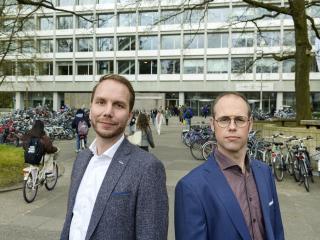Do personality tests contribute to wellbeing in the workplace?
With personality tests, organizations want to encourage their employees to develop their strengths. But can a simple questionnaire really contribute to more wellbeing? Tilburg University Magazine investigates.
The Big Five, Insights Discovery, the Jung Personality test, and the Gallup StrengthsFinder: just a small selection from the range of personality tests available. A personality test is a psychological test that gives insight into a person’s character. It can be used as a basis to decide what role you play or can play within an organization. That seems to make sense. Someone who is an extravert will probably do well in a job that requires a lot of social skills and you would not ask someone who does not have an eye for detail to do your paperwork.
What is the purpose of a personality test?
Dr. Marianne van Woerkom is an Associate Professor at the Department of Human Resource Studies of Tilburg University and Professor of Positive Organization Psychology at Erasmus University Rotterdam. She investigated, among other things, the best ways to encourage employee development by focusing on a person’s strengths. “For many years, it was usual for companies to hold regular performance interviews with their employees. Boxes were ticked for things that went well; the interview was then mainly about the things that didn’t go well and what the employee had to do to improve. That is a very dominant attitude and it is not at all productive.”

In theory, a personality test could help find better ways to divide tasks.
Dr. Marianne van Woerkom
Energy
“Often the things that do not go well are the things that people are not really interested in. The employee is confronted with them every year. Some tasks are part of the job, for instance, because of safety on the work floor. Other tasks can be delegated by dividing the work in a different way. In that case, you don’t need to develop on points that aren’t your thing. That thought has won ground in organizations in recent years. In theory, a personality test could help find better ways to divide tasks. In that way, everyone can do the things they are good at and that give them energy. Employers no longer need to inconvenience their workers who, as a result, will be more productive and more interested in personal development. And absenteeism will fall.”
How evidence-based are personality tests?
The focus on positive character traits is central to positive psychology. Marianne van Woerkom discovered among her own students what impact emphasizing strengths can have on personal development. Van Woerkom: “We investigated the Personal Growth Initiative. We divided the students into two groups. One half had to make a Personal Development Plan (PDP) in preparation for the job market, the other had to list and use their strengths . After some time, we saw that the latter group was much more actively busy with their personal development than the PDP group, even though they only had been given the instruction to use their strengths, not specifically to develop them. Apparently that inspired them to take their personal development in hand. Focusing on their strengths seems to fuel people’s wish to develop themselves and its effect is much greater.”
Most of these tests are not evidence-based. The reports may look very impressive, but academia has no access to what happens in the cooking.
Profile
The average approach of a personality test is simple: employees complete a questionnaire, which yields a profile. “People can compare their results and express their appreciation of each other. That is a good thing, but usually it ends there,” is Van Woerkom’s experience. “The next step is a hard one, namely: what does this mean for our organization and what are we going to do about it? Many organizations have difficulties with the practical application. Moreover, most of these tests are not evidence-based. The reports may look very impressive, but academia has no access to what happens in the cooking. So we have no idea whether those profiles are correct. There is a commercial reason, of course.”
Can you develop your talents based on a personality test?
Marianne van Woerkom thinks it is a positive thing that employers concentrate on their employees’ strengths. Evidence-based or not, employees do get some insight into their own qualities. Or do they?
“That requires more than completing a questionnaire. Most personality tests are of course based on what people report about themselves. But oddly enough, you are not the best judge of your own strengths that make you stand out in the crowd. You may think: ‘It is the obvious thing to do to be kind’ or: ‘It is a matter of course to be accurate, isn’t it?’ Other people may be better equipped to tell what is special about you. Discovering your strengths requires exploring multiple avenues. A questionnaire may be a start, but in addition you should ask people who know you well what they see when you are in your element. And ask people from different domains the same question, so your partner, your friends, people at the gym, and close colleagues. That input will show you the common thread. A different way to find out about your strengths is writing a manual about yourself. Act as if you were a piece of equipment and describe how you operate under different circumstances. After all, talent needs to be studied in context. Actor Theo Maassen interviewed comedians for his podcast Ervaring voor beginners [Experience for Beginners]. Herman Finkers and Paulien Cornelisse reported that it took them a lot of time to come into their own. Years later it turned out they were working in an environment that did not suit their talents. The context determines whether your talents can manifest themselves.”
It is true that in the Netherlands, we are not very good at pointing out our talents. Americans are way better at this.
Guesswork
Lastly, there is the question of whether personality tests aren’t a waste of time in our society, where there isn’t a culture of people patting themselves on the back. Van Woerkom: “It is true that in the Netherlands, we are not very good at pointing out our talents. Americans are way better at this. And yet these tests are increasingly used. The intentions are right, but the tests themselves still constitute guesswork.”
Date of publication: 31 May 2023



